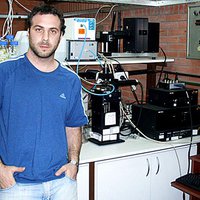Biotechnology & medicine
Christina Fan
Prenatal testing for genetic conditions from a sample of the mother’s blood

Latin America
Javier Gómez Méndez
Affordable mobile technology to control heart disease

Latin America
Marcelo Martí
New approach in the search for effective TB treatment

Europe
Thibaut Mercey
Fast detection of pathogenic bacteria in food to prevent infections

Latin America
Damar Lizbeth López Arredondo
Genetically modified crops to optimize the use of fertilizers
